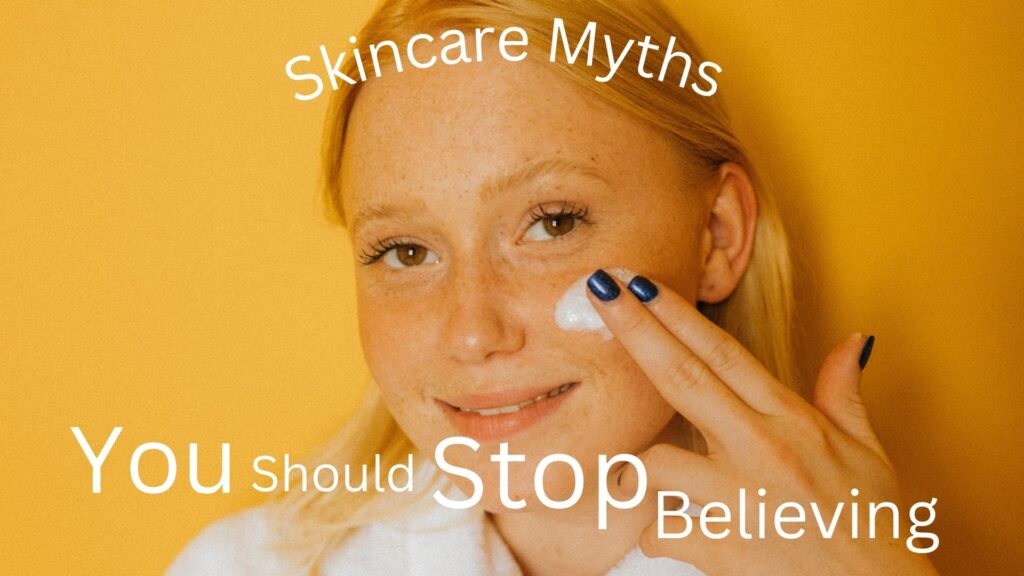Myth: Drinking water keeps your skin hydrated.
Fact: “There is no evidence that drinking more or less water is helpful or harmful to your skin. While drinking more water can be beneficial for other health conditions, water does not automatically get absorbed by your skin when you drink it. It hydrates our cells as it is absorbed by the bloodstream and filtered by the kidneys, which does help hydrate our bodies overall. However, if you are severely dehydrated, that will obviously take a toll on your skin, as well as the rest of your body. The best way to keep your skin hydrated is to avoid dry air (or use a humidifier), use a gentle cleanser, and use a moisturizer daily or ingredients that help keep moisture locked in your skin barrier, like hyaluronic acid.
Myth: Not washing your face causes acne.
Fact: “Hygiene doesn’t play a role in the development of acne. Acne involves oil production, bacteria, clogged pores, and inflammation, with hormones and stress playing a significant role and (to a lesser extent) diet for some people. Not washing your face doesn’t help your situation but it certainly doesn’t cause acne.
Myth: A spray tan protects your skin from sunburn.
Fact: “A spray tan simply changes the color of your skin, nothing more. There is no UV protection in having darker skin cells. Like the mythical ‘base tan,’ many people still mistakenly believe that a spray tan acts as a shield against sunburn. In a way, it’s worse because you won’t easily see your skin turning red as it sunburns.
Myth: Natural, botanical skincare products are better for your skin.
Fact: “One of the biggest myths encounter in dermatology and medicine, in general, is that natural and organic products are safer. Natural-based skincare products are often unregulated and tend to contain botanicals and essential oils that can lead to significant allergic contact dermatitis in some people. I always give the example of organic poison ivy or snake venom just because it comes from nature doesn’t mean it’s safe or not toxic.
Myth: Eye creams don’t do anything.
Fact: “An eye cream can have many benefits if it contains the right ingredients and is formulated for your specific skin concerns. If your concern is dark circles or puffiness due to fatigue, an eye cream with caffeine can definitely help control inflammation and make your under eyes appear brighter. However, caffeine alone won’t do the trick, and it should be combined with smoothing, hydrating, and brightening ingredients, such as hyaluronic acid, vitamin C, and retinol, as the combination can eliminate fine lines, wrinkles, and dark circles, and help give the skin an overall youthful appearance.
Myth: Wounds need to breathe to heal.
Fact: “There is good evidence to support that wounds should be covered and kept moist with products like petroleum jelly (or Vaseline) in order to heal. Letting a wound dry out will create a crust and this may actually impede wound healing and worsen the appearance of the final scar. Keeping a wound covered will also help protect it from infection.
Myth: You don’t need retinol until age 50.
Fact: “Retinol has often been referred to as the ‘gold standard of skincare and will continue to stay that way in the new year. Using retinol can increase collagen production and skin cell turnover, help treat acne, unclog pores, minimize fine lines and wrinkles, and even out skin tone. It is ideal to start using retinol in your mid-late 20s in order to prevent damage from occurring. After all, it’s easier to prevent a wrinkle than get rid of one! Start introducing retinol slowly into your routine about two or three times a week. After a few weeks, you can start using it almost every day.
Myth: There’s no need for sunscreen in the fall or winter.
Fact: “Many people think you only need sunscreen in the summer, but this is a myth. The ultraviolet (UV) rays that cause sunburn are not as strong in the winter, but they are always present. The UV rays that cause fine lines, wrinkles, and skin hyperpigmentation are present year-round and it’s important to apply sunscreen throughout the year. UV rays even penetrate clouds, so you should plan on wearing sunscreen every day if you plan on being outdoors.
Myth: Toners are a necessary part of an acne skincare regimen.
Fact: “Acne-prone people are often looking for products to combat their oily skin. Toners are touted as a way to cleanse the skin of excess oil after washing. However, washing with a gentle cleanser and water is adequate to thoroughly cleanse the face. You do not need to skin to be 100 percent squeaky clean and stripped of all its natural oils. Historically, toners were often formulated with alcohols, which produce drying effects that compromise the skin and cause free-radical damage. Toners that contain alpha and beta hydroxy acids can work to exfoliate the skin and potentially minimize acne breakouts, but these ingredients are often already included in acne washes.

